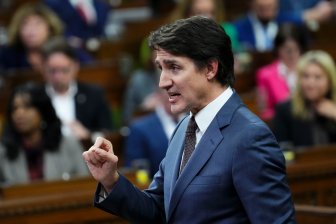WARNING: This story deals with disturbing subject matter that may upset and trigger some readers. Discretion is advised.
Indigenous child welfare advocates in B.C. are celebrating a “huge win” in Ottawa on Friday, where a federal law affirming that First Nations, Métis and Inuit people have sole authority to protect their children was upheld in court.
Mary Teegee, chair of the Indigenous Child and Family Services Directors Forum, said she heard the news in a morning phone call from her lawyer, who told her the case had been “won on every point.”
“Of course I screamed, I was really happy, it was just a great wonderful moment for our children — a huge win for our children,” Teegee told Global News. “Our most important resource is our children.”

The Supreme Court of Canada’s decision to deny Quebec’s appeal of Bill C-92 was unanimous. In 2022, Quebec had won in the Court of Appeal, which found parts of the act overstepped federal jurisdiction.
Indigenous Peoples have always had an inherent right to self-government and to care for their children.
Mountains of research and testimony have documented the intergenerational trauma and harm caused by various colonial interventions in the lives of Indigenous children and families.

More than 150,000 First Nations, Métis and Inuit children were taken from their families beginning in the 1830s and imprisoned in residential schools, where the church and state sought to erase their languages, cultures and identities. Countless thousands were subjected to gratuitous abuse and an unknown number — many thousands — never returned.
Between the 1950s and 1980s, countless Indigenous children were taken again from their parents, often without consent, in a movement known as the ’60s Scoop. Governments placed those children in non-Indigenous homes.
Many were stripped of their language and culture, left with complex questions about their identities, and abused.

Today, Indigenous children continue to be overrepresented in provincial care. As of March 2022, the latest year for which statistics are posted publicly, they made up 68 per cent of youth in care in B.C.
The B.C. government only ended the controversial “child welfare practice” of birth alerts in 2019. For decades, that system sent an alert — usually without the consent of the expecting parents — when there may be a safety risk to newborns.
The province admitted at the time it disproportionately targeted Indigenous women, and advocates have said it resulted in many wrongful and painful infant apprehensions.

Teegee said Friday’s court win provides Indigenous Peoples with a powerful legal tool that reaffirms their inherent right to care for their children “in the right way, the Indigenous way.”
“Every step that we take, every win that we make, is getting us truer to that place, closer to that place where we’re going to be having the authority, if you will, to develop laws in all realms, all the different parts of our society,” she explained.
“Today is really for our children. I think of all the ones that are no longer with us, the ones who died in horrific situations within care, the ones who were never able to go home because they were in stranger care. I think this win is for them.”

In a news release, Carrier Sekani Family Services (CSFC) — an intervener in the case — also applauded the high court’s decision. The Indigenous-led organization, based in Vancouver and Prince George, has an award-winning child welfare program serving 11 First Nations in B.C.
“This decision clears the way for our Nations to devote their time and resources to the work that matters — caring for our children,” said Warner Adam, CEO of the CSFC, in the release.
“We have advocated and worked very hard to change the system, we finally have our right to care for our children our way and is protected by the constitution of Canada,” added board president and Saik’uz First Nation Chief Priscilla Mueller.
“Now the B.C. government has no choice but to ensure that it has a process to support First Nations Autonomy and inherent rights in all aspect of Indigenous well-being.”

Lawyer Scott Smith, which represented CSFS and the Cheslatta, Nadleh, Saik’uz, and Stellat’en First Nations in the proceedings, called it a “historic decision” that sets an important legal precedent, as well as a “hugely important” step forward in reconciliation.
“The treaty process has failed a number of nations here in British Columbia,” he explained. “Some nations have spent 30 to 40 years without getting to an agreement.
“That was a particular experience for the Carrier Sekani communities, and that’s some of the evidence that they brought forward and the arguments that they ultimately made to the court as to the purpose and intent and in fact, need of this legislative mechanism.”

A number of First Nations are currently negotiating with the B.C. government to retake jurisdiction over child welfare and spearhead their own culturally appropriate services. While the province provides child and family services to most residents, some 118 First Nations, urban Indigenous and Métis communities have access to a delegated Indigenous child and family services agency instead.
The province shuffled a new minister — Grace Lore — into the Ministry of Children and Family Development (MCFD) last month. At the time, Premier David Eby said the department is experiencing a “significant reset.”
“I don’t think it’s a surprise to anyone to say that the ministry and particularly the system in the province has faced significant challenges in reaching our shared goal of ensuring every kid is looked after the way that they should be,” he said.
“It is certainly one of the most challenging, if not the most challenging file, because of what’s at stake.”

There were 50 per cent fewer children in government care in 2022 than in 2001.
As of December 2021, MCFD reported the number of B.C. children and youth living with relatives or friends, as opposed to in foster care, had increased 69 per cent from 2018 – from 1,100 to more than 1,900. More than 93 per cent of those in need of protection resume living with their families safely after receiving government support.
— with files from Neetu Garcha and The Canadian Press
The Hope for Wellness Help Line offers culturally competent counselling and crisis intervention to all Indigenous peoples experiencing trauma, distress, strong emotions and painful memories. The line can be reached any time toll-free at 1-855-242-3310.
 Asian Tribune Your Multilingual Newspaper covering World and local news News
Asian Tribune Your Multilingual Newspaper covering World and local news News


